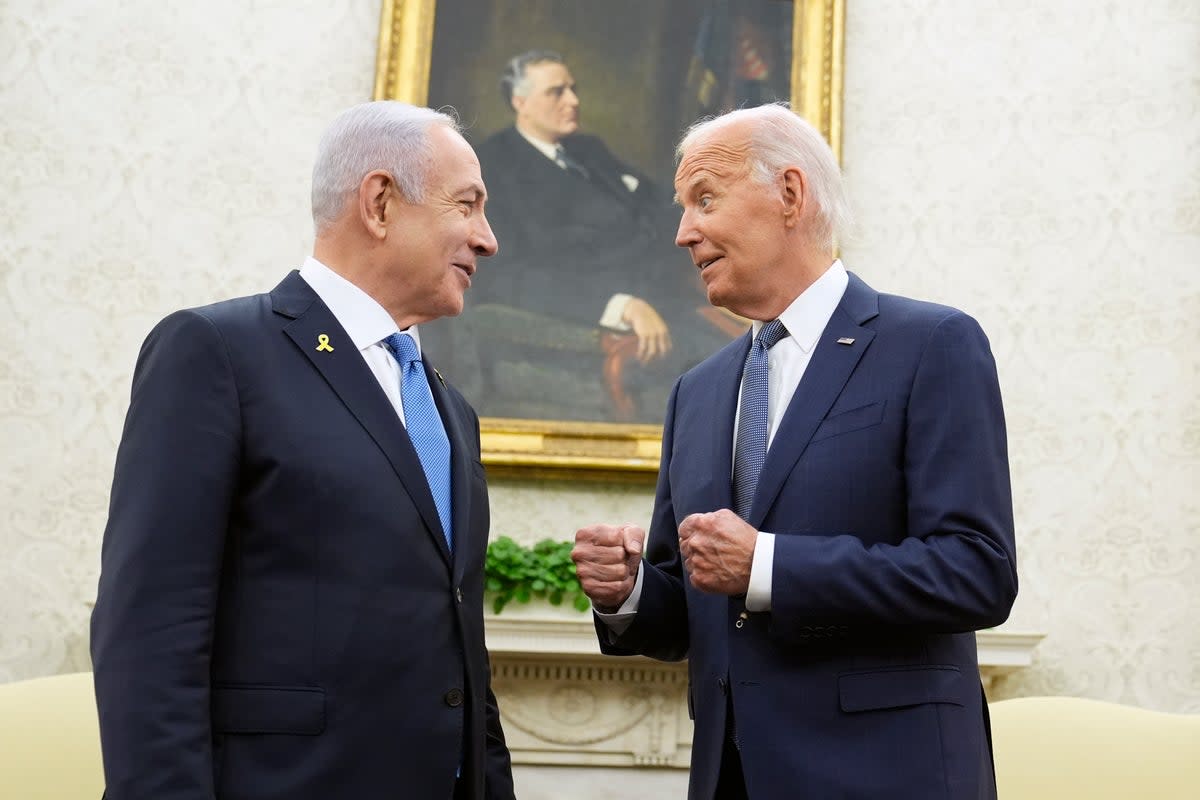Harris promises ‘not be silent’ about Gaza humanitarian crisis after Netanyahu talks

Vice President Kamala Harris on Thursday said she “would not be silent” about the “devastating” humanitarian situation in Gaza following what she described as a “frank and constructive” conversation with Israeli Prime Minister Benjamin Netanyahu.
It was the duo’s first face-to-face meeting since Harris became the de facto Democratic Party nominee in this year’s presidential election.
Harris, who met with Netanyahu in her ceremonial Washington, DC, office after returning from a campaign stop in Texas, told reporters that she told the Israeli leader she would “always” assure that his nation would be able to defend itself.
“From when I was a young girl collecting funds to plant trees for Israel to my time in the United States Senate and now at the White House, I have had an unwavering commitment to the existence of the State of Israel, to its security and to the people of Israel,” she said.
Harris added that Israel “has a right to defend itself,” but she stressed that “how it does so matters” as well, calling Hamas “a brutal terrorist organization” and citing the killing of 1,200 people during the October 7 attacks, as well as “horrific acts of sexual violence” and the kidnapping of at least 250 hostages.
But she also told reporters that she’d expressed to Netanyahu “serious concern about the dire humanitarian situation” in Gaza, which includes over 2 million people facing “catastrophic levels of acute food insecurity.”

“What has happened in Gaza over the past nine months is devastating. The images of dead children and desperate, hungry people fleeing for safety, sometimes displaced for the second, third or fourth time, we cannot look away in the face of these tragedies. We cannot allow ourselves to become numb to the suffering, and I will not be silent,” Harris said.
Harris’ remarks came just hours after President Joe Biden and Netanyahu were unfailingly cordial to each other while speaking in the Oval Office at what could be their last face-to-face talks before Biden leaves office.
Netanyahu, who has been a thorn in the side of Democratic presidents for his work to undermine the two-state solution to the long-running Israeli-Palestinian conflict, praised Biden’s long-standing support for Israel while he and the American leader spoke to reporters ahead of their bilateral talks.
“Mr President, we’ve known each other for 40 years, and you’ve known every Israeli prime minister for 50 years ... So from a proud Jewish Zionist to a proud Irish American Zionist, I want to thank you for 50 years of public service and 50 years of support for the State of Israel, and I look forward to discussing with you today and working with you in the months ahead on the great issues before us,” Netanyahu said.
Biden replied that he looked forward to working with the Israeli leader over his final six months in office and noted that his first meeting with an Israeli leader – then-prime minister Golda Meir – also included Yitzhak Rabin, then an assistant to Meir.
Rabin, who served as Israel’s head of government from 1974-1977 and regained the prime minister’s post in 1992, was the Israeli leader who signed the landmark peace deal that brought the Palestinian Authority into existence and laid out a roadmap for peace that has largely been ignored by Netanyahu. He was assassinated in 1995 by an Israeli right-wing extremist who was opposed to the peace process.
The relatively civil sitdown between the two leaders came the day after Netanyahu addressed Congress with a thundering and often bellicose set of remarks where he condemned pro-Palestinian protesters as “useful idiots” who serve the interests of the Iranian government.

As he spoke in the House of Representatives’ cavernous chamber, protesters clashed with police officers and defaced monuments near Washington, DC’s main train station. Some burned American flags, replacing them with Palestinian ones.
The violence was widely condemned by both Biden and Harris, who, in a statement on Thursday, denounced the “despicable acts by unpatriotic protestors and dangerous hate-fueled rhetoric” and condemned “any individuals associating with the brutal terrorist organization Hamas.”
The meeting between Biden and Netanyahu also took place less than 24 hours after Biden delivered a televised speech explaining his decision to not seek re-election and to endorse Harris – who is set to meet with Netanyahu later in the day.
Biden has spent months unsuccessfully attempting to pressure Netanyahu into moderating his approach to his nearly year-old war on Hamas in hopes of bringing about a deal to return the more than 100 hostages who are still being held by the militant group.
Members of Biden’s own party have urged him to break more forcefully with Netanyahu, citing the Israeli leader’s longstanding habit of snubbing Democratic presidents and interfering in American politics in favor of Republicans, who have largely given him a free hand to do what he pleases when it comes to the Palestinians.
Yet White House National Security Communications adviser John Kirby told reporters the relationship between the two leaders was a “healthy” one despite the tensions.
“By healthy, I mean they're not going to agree on everything. They haven't – through the long political lives that both of them have enjoyed – always agreed on everything. They come from two different political traditions, but they know one another,” he said.
Kirby added he believes Biden is “very comfortable” in his relationship with Netanyahu and “the ability that he has to be candid and honest and lay it all out there” in talks with the Israeli leader.
